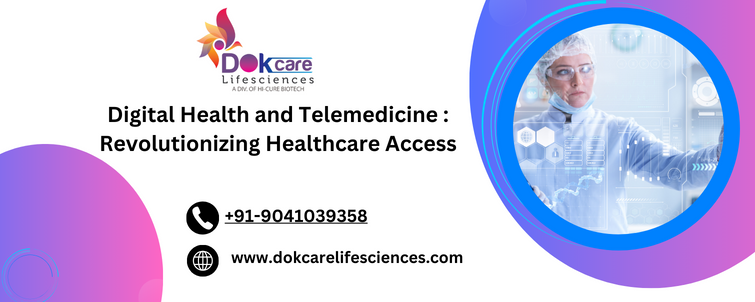Digital Health and Telemedicine

How to Lose Weight in 7 Days
May 7, 2024
Strategies For Success in PCD Pharma Franchise
May 10, 2024Digital Health and Telemedicine : Revolutionizing Healthcare Access
In the rapidly evolving world of healthcare, digital health and telemedicine stand out as revolutionary forces. These technologies are not just reshaping how care is delivered; they are completely redefining the interaction between healthcare providers and patients. By leveraging the power of the internet, mobile devices, and advanced computing, digital health and telemedicine make healthcare more accessible, cost-effective, and tailored to individual needs. This article explores the key aspects of digital health and telemedicine, their benefits, challenges, and what the future holds for this exciting field.
Understanding Digital Health and Telemedicine
Digital Health broadly encompasses all digital technologies that support healthcare delivery. This includes electronic health records (EHRs), wearable devices, health apps, and artificial intelligence (AI) applications. These technologies collect, store, and analyze health data, offering unprecedented insights into patient health and treatment outcomes.
Telemedicine refers specifically to the delivery of healthcare services remotely, using telecommunications technology. This can include video consultations, remote monitoring, and digital diagnostic services. Telemedicine allows patients to receive medical care from the comfort of their own homes, eliminating geographical barriers and reducing the need for travel.
The Impact of Digital Health and Telemedicine
1. Increased Access to Healthcare
One of the most significant impacts of digital health and telemedicine is the increased access to healthcare services, especially for people in remote or underserved areas. Patients who previously had limited access to specialists can now receive high-quality care remotely.
2. Cost Reduction
Digital health helps reduce healthcare costs by minimizing the need for physical office visits, reducing hospital readmission rates, and allowing for better chronic disease management. Telemedicine has been particularly effective in reducing the costs associated with chronic condition management.
3. Improved Patient Engagement and Satisfaction
Digital tools empower patients by giving them more control over their health and healthcare decisions. Mobile health apps and wearable technology provide continuous health monitoring and real-time feedback, engaging patients in their health management more actively than ever before.
4. Enhanced Quality of Care
Telemedicine has proven to be an effective medium for improving the quality of healthcare. It facilitates faster diagnosis, timely treatment, and better patient-provider communication. The use of AI and machine learning in analyzing patient data can also predict health trends, prevent illnesses, and personalize care plans.
Challenges Facing Digital Health and Telemedicine
Despite the numerous benefits, there are significant challenges that need addressing:
1. Privacy and Security Concerns
The increased use of digital tools raises significant concerns regarding the security and privacy of patient data. Healthcare providers must ensure robust cybersecurity measures are in place to protect sensitive information.
2. Regulatory Issues
The healthcare industry is heavily regulated, and introducing new digital health technologies often involves navigating a complex regulatory landscape. Ensuring compliance with all applicable laws and regulations is crucial for the widespread adoption of telemedicine and digital health solutions.
3. Technological Barriers
Not all patients and providers have access to the necessary technology or the internet connectivity required for telemedicine. This digital divide can limit the effectiveness of digital health initiatives, particularly in rural or impoverished areas.
4. Resistance to Change
There is often resistance to change within the healthcare sector, where traditional face-to-face consultations are the norm. Both patients and healthcare providers may need significant persuasion and evidence of effectiveness to adopt new technologies.
The Future of Digital Health and Telemedicine
Looking ahead, the future of digital health and telemedicine appears incredibly promising. As technology advances, we can expect even more innovative solutions to emerge. Integration of AI with telemedicine, expansion of mobile health applications, and greater use of data analytics in healthcare decision-making will drive further improvements in healthcare delivery.
Continued investment in technology, along with supportive policies and frameworks, will be essential to overcome current challenges. Collaboration among tech developers, healthcare providers, and regulatory bodies is crucial to ensure these technologies reach their full potential.

Conclusion
Digital health and telemedicine are not just temporary fixes but are fundamentally transforming the landscape of healthcare. They promise a future where healthcare is more accessible, efficient, and personalized than ever before. While challenges remain, the ongoing advancements in technology and increasing global focus on healthcare innovation suggest that digital health will continue to evolve and play a crucial role in shaping the future of healthcare. As these technologies become more integrated into mainstream healthcare, they will undoubtedly continue to break down barriers and enhance the overall quality of care provided to patients worldwide.
Contact Information
Contact Dokcare Lifesciences, if you want to get any details regarding Digital Health and Telemedicine : Revolutionizing Healthcare Access or any other details regarding our company.
Company Name: Dokcare Lifesciences
Company Address: Plot no 295, Industrial area phase- 2, Panchkula- 134 109, Haryana (India)
Phone Number: +91- 90236 39358, +91- 90410 39358
Email: dokcarelifesciences@gmail.com
Website: www.dokcarelifesciences.com

